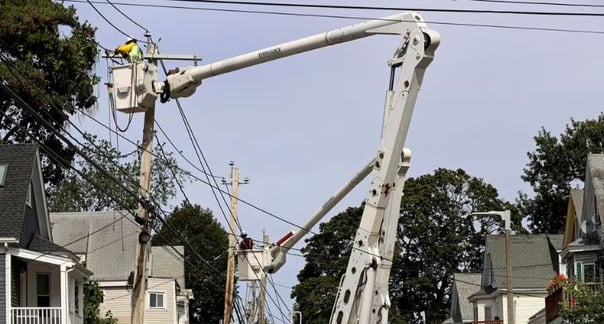Municipal Aggregation Comes to Rhode Island! Greener power at lower cost.
We're excited to announce the start of something good in Rhode Island. Seven cities and towns have adopted “green...
 If there's one thing we hate at Green Energy Consumers Alliance, it’s greenwashing. This is the practice of exaggerating or lying about the worthiness of a good or service with respect to environmental impact. Our organization exists to help people find their way to economically and environmentally sound energy solutions. So, it breaks our hearts when we see some companies take advantage of the fact that it’s often easy to make a product sound better than it is. Case in point: Renewable energy in the electricity market.
If there's one thing we hate at Green Energy Consumers Alliance, it’s greenwashing. This is the practice of exaggerating or lying about the worthiness of a good or service with respect to environmental impact. Our organization exists to help people find their way to economically and environmentally sound energy solutions. So, it breaks our hearts when we see some companies take advantage of the fact that it’s often easy to make a product sound better than it is. Case in point: Renewable energy in the electricity market.
Consumers who are interested in receiving electricity supply with more renewable energy content than required by law are far better served by municipal aggregation than through utility Basic Service or a retail competitive electricity supplier. By renewable energy content, we assert that the proper standard for whether the supply is really “green,” meaning that it accomplishes the goal of putting more zero-emission power onto the grid, is whether the added renewable energy is certified by Massachusetts as “Class I” or Rhode Island as “new.”
We have been making this point for a long time. Our view is also held by other leading environmental organizations such as Clean Water Action, Mass. Audubon, Mothers Out Front, and more.

“We hereby recommend that voluntary renewable energy purchases result in the retirement of Massachusetts RPS qualified Class I RECs.”
Not all renewable energy certificates (RECs) have equal value or impact. When you think about adding more renewable energy to the grid, you probably assume that the wind and solar projects are nearby or at least connected to the New England power pool that serves Massachusetts and Rhode Island. You are probably not thinking that a project in Texas would have an effect here.
That is why we need competitive suppliers to adhere to some standards. According to data compiled by the Mass. Department of Energy Resources, it is clear that competitive suppliers are failing to meet the Class I test. In 2021:
Note that the other 26% of Class I RECs settled outside of municipal aggregation came from non-profit programs like our Green Powered program, progressive municipal utilities such as Concord, and a few corporate purchases.
Furthermore, the data quoted above is from 2021. Today, there are more municipal aggregations in operation around the Commonwealth (and Rhode Island) with many more likely to begin later this year. We’re confident that aggregations alone in 2025 will consume over one million RECs.
And yet – the competitive electricity supplier industry has mounted an aggressive campaign on Beacon Hill to preserve their right to greenwash. The industry says that they give consumers the choice to buy greener power and they have even filed their own bill to address some consumer complaints. The image that should pop into your head is the Trojan Horse.
Given the evidence presented above, we hope that the Massachusetts Department of Public Utilities will find a way to approve new and modified aggregation plans submitted by cities and towns far more quickly than in recent years. It seems as if some progress is being made on that score.
In addition to action by the DPU, the legislature can act to eliminate the greenwashing and consumer rip-offs visited upon us by retail electricity suppliers. Some things about energy are complex. This issue is damn straightforward. Retail electricity suppliers should no longer be allowed to sign up new customers. Please contact your legislator and ask them to support “An Act Relative to Electric Ratepayer Protections,” House bill 3196 or Senate bill 2106.
You can find your legislator’s contact information here.
 Andrea Campbell (Massachusetts Attorney General) and Michelle Wu (Mayor of Boston) recently published an opinion piece on this topic, Massachusetts Should Ban Third-Party Electric Suppliers. Read the full Boston Globe article here.
Andrea Campbell (Massachusetts Attorney General) and Michelle Wu (Mayor of Boston) recently published an opinion piece on this topic, Massachusetts Should Ban Third-Party Electric Suppliers. Read the full Boston Globe article here.
"Forty percent of residents in Dorchester and Mattapan, two Boston neighborhoods with a high proportion of low-income residents, are enrolled with one of these suppliers. Compared to the city’s Community Choice Electricity program, residents have paid suppliers as much as $300 extra per month."
We're excited to announce the start of something good in Rhode Island. Seven cities and towns have adopted “green...
As recently covered by the Boston Globe, Green Energy Consumers is excited to present our new report on the great...
Comments